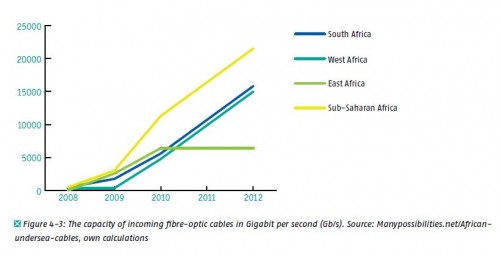Interesting points from ‘Futures of Technology in Africa’

Capacity of fibre-optic cables by region. Click to enlarge. {STT 42 http://www.stt.nl/uploads/documents/192.pdf}
Futures of Technology in Africa, a book recently authored by Jasper Grosskurth and published by STT Netherlands Centre of Technology Trends, comes after three years and hundreds of conversations on the subject of African technology. The results touch on the dynamic nature of African economies, business, infrastructure, mobile, energy, and more. Interesting and useful information jumps off every page. Below are some of the notable points regarding the study’s conclusion of Africa’s ICT futures:
On the difficulty of quantifying African trends and statistics:
- Margins of data error are often 30-40% (15)
On the equal attention given by global media to small events and megatrends:
- In international publications on Africa, little difference is made between inspiring, but small-scale, individual ideas and pan-African megatrends. The installation of a containerized classroom of computers in rural Ghana is reported in the same manner as the massive leaps in connectivity that Africa is undergoing. The first affects the lives of a small community and requires an investment of several thousand US dollars, the second affects the lives of the majority on the continent and requires an investment of several hundred million US dollars. However, a picture of a group of children sitting behind a computer, or better even, smiling and waving at the camera, is much easier to publish than one of a cable and a dark bungalow of transmitters. In terms of future impact and in terms of timelines, this book distinguishes four levels: concepts, seeds of change, trends and megatrends. (36)
On how stats (with error) vary by country:
- Depending on the source and definition, 30–40% of the population are mobile phone users, ranging from more than 90% in South Africa to less than 5% in Zimbabwe. (40)
On broadband cable growth:
- By 2013, Eritrea and Western Sahara will be the only two countries without direct access to a data cable. (43)
On providing power for large clusters of servers (such data centers are unlikely in the near future for most nations):
- A typical Google data centre requires a reliable electricity supply of 30MW. In 2009, the country of Rwanda with its 10.5 million inhabitants had a maximum power supply of 69MW, including 30MW of leased diesel generators, rendering the idea of establishing a data centre an impossibility. (46)
An anecdote speaking to how technology increases political freedom and empowers citizens:
- It is said of Sudanese mobile phone pioneer Mo Ibrahim that he considered it impossible to keep a dictatorship in place in a country where mobile penetration had reached a certain threshold. The ability of people to exchange information freely would itself be a democratizing factor. (47)
Although mobile penetration may be high, many phones do not provide intuitive web access:
- As a rough estimate, about 2% of African phones could be classified as smartphones with user-friendly mobile web capabilities. (48)
On the challenges of learning about the Internet by using mobile rather than a conventional computer:
- Simon Dingle: If people haven’t used the internet on a computer, it’s very difficult to conceptualize what it is and how it works andhow to use it. (48)
On up-and-coming trends:
- New trends: low data costs that fuel business and reliable information as more individuals come online. (56)
On continental voice, money, and data networks:
- For the first time in the continent’s history, a truly transcontinental infrastructure exists, covering north, south, east and west, coasts and hinterland. However, the mobile phone network will not remain the only such network for long. At least two more ICT-based networks are about to reach all corners of Africa: a money transfer network and a data transfer network. (134)
On negative consequences of technology in Africa:
- Continental networks will be used to incinerate conflicts, organize crime, exclude groups and denounce individuals. As everywhere else in the world, privacy will be violated, debts will be incurred, media addiction will occur, pornographic material will be accessible for children. (134)












 Twitter
Twitter Facebook
Facebook Pinterest
Pinterest